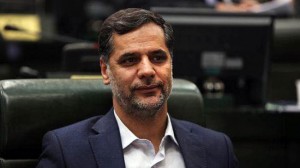[caption id="attachment_24017" align="alignright" width="180"] Spokesman for Iran’s Majlis National Security and Foreign Policy Committee Seyyed Hossein Naqavi-Hosseini[/caption]
Spokesman for Iran’s Majlis National Security and Foreign Policy Committee Seyyed Hossein Naqavi-Hosseini[/caption]
TEHRAN (FNA)- A senior Iranian lawmaker voiced the parliament's readiness to back improvement of bilateral relations between Tehran and London through applying possible means.
Speaking on Monday, Rapporteur of the Iranian Parliament's National Security and Foreign Policy Commission Seyed Hossein Naqavi Hosseini said that the current level of bilateral relations is beneath the dignity of the Islamic Republic, and added that Tehran and London must make a final decision and appoint chargés d'affaires or ambassadors.
“If Britain treats Iran with…mutual respect and according to international conventions, the Iranian parliament is ready to form a parliamentary friendship group with the country,” Naqavi Hosseini said.
“The parliament believes in active parliamentary diplomacy and if Iran-UK ties resume based on mutual respect, it is ready to cooperate,” he added.
In October, Iran and Britain agreed to announce the names of their non-resident charges d’affaires.
In a meeting at the UN Headquarters in New York City on September 23, Iranian Foreign Minister Mohammad Javad Zarif and his British counterpart William Hague discussed improvement of Tehran-London relations, Iran’s nuclear energy program as well as regional developments.
On November 27, 2011, Iranian lawmakers voted by a large majority to downgrade diplomatic ties with the United Kingdom, in response to Britain's decision to impose sanctions on the Central Bank of Iran over the allegation that Iran is pursuing non-civilian objectives in its nuclear energy program.
Two days after the decision by the Iranian parliament, hundreds of Iranian students staged a protest outside the British Embassy in Tehran and pulled down the UK flag.
On November 30, 2011, London cut off its ties with Tehran, withdrew its diplomatic staff from Iran and the Iranian Embassy in London was closed.
By Fars News Agency
The Iran Project is not responsible for the content of quoted articles.

 QR code
QR code